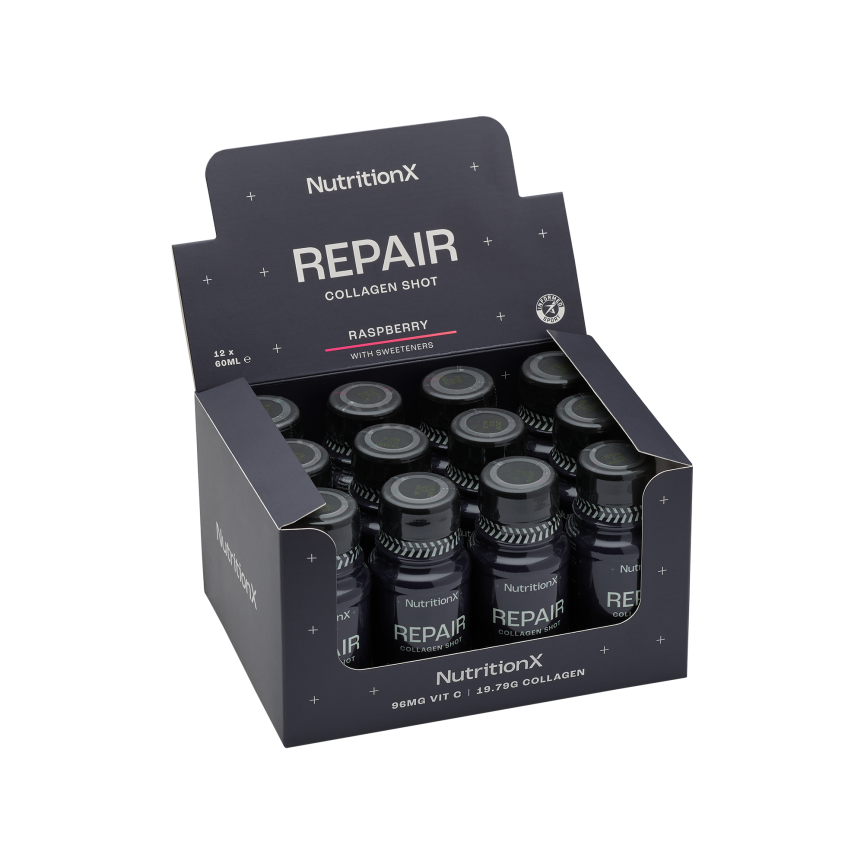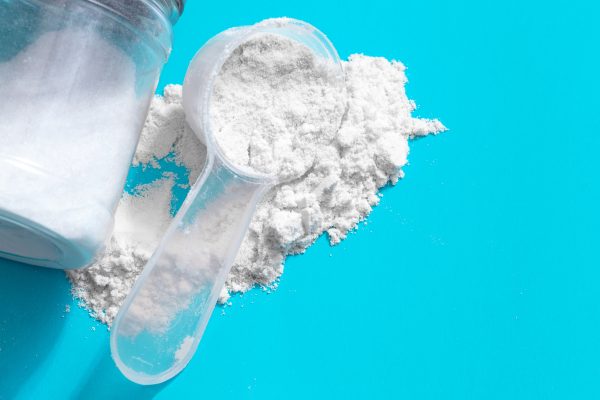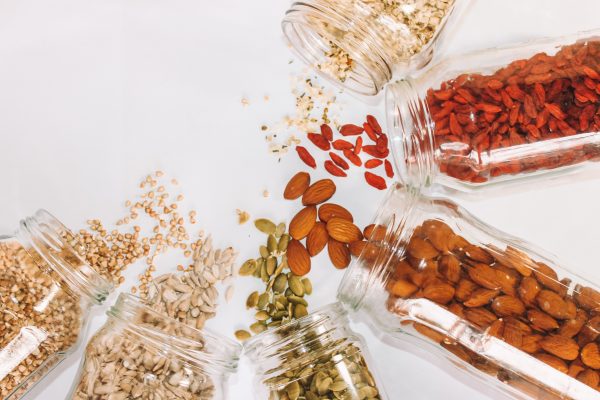For athletes looking to maximise their athletic performance, avoiding injury is key. Athletes subject their bodies to intense physical demands on a regular basis and the use of collagen supplements can offer direct benefits in aiding recovery.
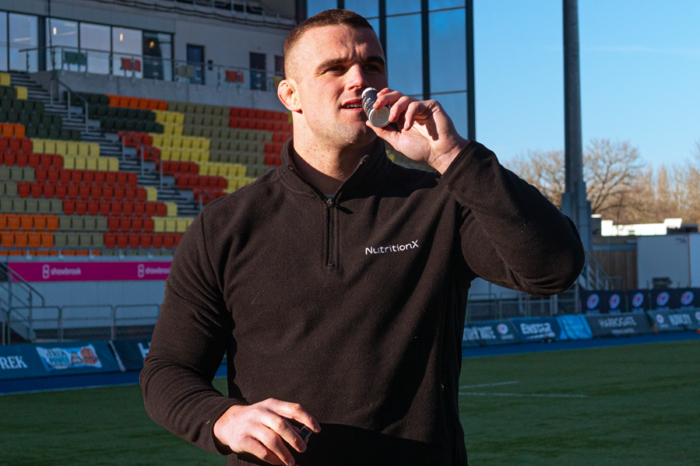
For athletes, collagen supplements such as Nutrition X's collagen repair shots can be used to promote joint health and support joint and tendon injury recovery. Whilst it’s important that athletes meet their energy requirements when training to ‘fuel the work’ performed, it is also important that athletes recover adequately to prevent the occurrence of injury, which is where collagen comes into play.
Here, our resident sports nutritionists Danny Webber and Caraigh McGuinness explore the benefits of collagen supplements for athletes, and how they can support the pursuit of athletic goals.
WHAT IS COLLAGEN?
Collagen is a tough structural protein that builds tendons and ligaments. Therefore, the overall strength and stiffness of our tissues and tendons is down to the collagen content in the body. Collagen synthesis not only requires a good supply of the amino acids proline and lysine, found in abundance in collagen protein, but also the presence of vitamin C, copper and zinc.
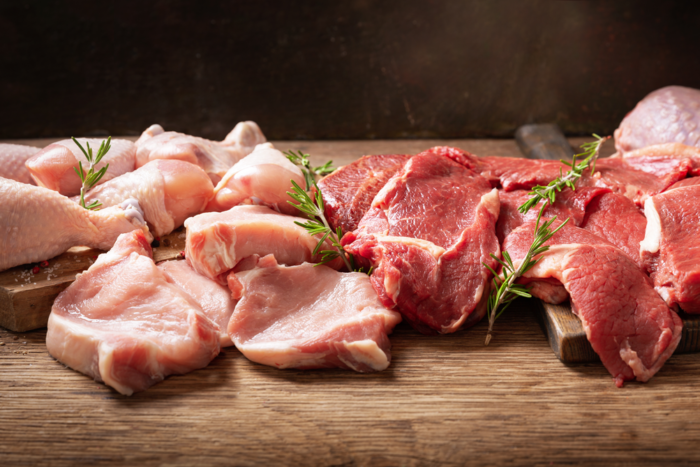
These essential amino acids, necessary to synthesise new collagen, can be found in animal sources such as beef and poultry, as well as in eggs and dairy. If you are an athlete that suffers from injuries such as sprains or strains, it may be beneficial to increase collagen intake through supplements.
WHAT DOES COLLAGEN DO IN THE BODY?
Collagen is vital for improving and maintaining joint and tendon health in the body. Research has suggested that a combination of training and collagen supplementation can strengthen the myotendinous junction and improve muscle-joint interaction, ideal for athletes looking to prevent injury, as well as those recovering from joint injuries and joint surgery.
HOW DO COLLAGEN SUPPLEMENTS WORK IN THE BODY?
Collagen supplements provide the body with key amino acids proline, hydroxyproline and glycine that support the structure of connective tissues like tendons. Well formulated collagen supplements, like the Nutrition X Repair Shot, will include vitamin C which help collagen protein synthesise in the body; the process through which the body makes its own collagen. By ensuring the body has these ‘building blocks’ necessary for making collagen, collagen supplements ensure that tendons and ligaments have the all-important levels of collagen they need to remain healthy, or to help repair them when injury strikes.
IS COLLAGEN BENEFICIAL FOR ATHLETES?
Collagen supplements can be beneficial for athletes as they support joint health. Collagen is a key protein in the body that helps maintain the integrity of connective tissues, including tendons, ligaments and cartilage. For athletes, these tissues are crucial for mobility and strength. Studies have shown that collagen supplements may reduce joint pain and improve joint function, making it easier for athletes to train and recover from intense workouts.
WHAT IS THE BEST COLLAGEN FOR ATHLETES?
Hydrolysed collagen (or collagen hydrolysate) extracted from bovine sources is a high-quality choice for athletes to best support their connective tissue and bone health. The collagen peptides are broken down and more readily absorbed by tissues for faster and more effective collagen protein synthesis.
COLLAGEN SUPPLEMENTS FOR TENDON REPAIR
Ligaments and tendons are a connective tissue that are made up of collagen proteins. Taking collagen supplements can promote the health of ligaments, particularly as a recovery measure if an injury is sustained, i.e. ACL, which is very common in team sport athletes.

IS IT BETTER TO DRINK OR APPLY COLLAGEN?
Drinking collagen - as opposed to consuming food, powder or tablet sources - in a ‘shot’ drink like the Nutrition X Repair Shot allows for the collagen peptides to be absorbed by the connective tissues for a faster and greater stimulation of collagen protein synthesis, enabling a more effective recovery process.
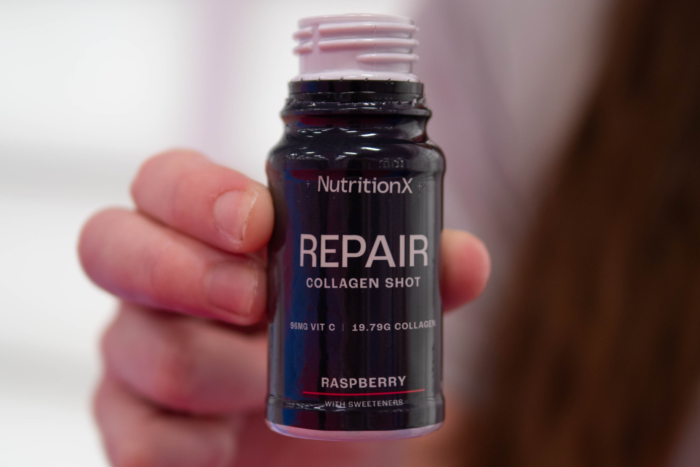
SHOULD I TAKE COLLAGEN BEFORE OR AFTER A WORKOUT?
Collagen supplements should be taken 30-45 minutes before exercise, particularly rehab-specific exercises. The presence of these circulating amino acids in the body peaks after 1 hour and can therefore infiltrate tissues at the right time to maximise recovery benefits.
HOW MUCH COLLAGEN DOES AN ATHLETE NEED?
Research suggests that 15-20g of collagen daily is an effective dose to maximise the recovery response - and therefore act as a preventative measure - to connective tissue injuries such as ACL or achilles tendon injuries.
HOW OFTEN SHOULD ATHLETES TAKE COLLAGEN?
To see the maximum benefits of taking collagen supplements, athletes should integrate a daily collagen supplement into their nutrition strategy. This is particularly the case for athletes recovering from a joint or tendon injury, where the presence of collagen is important for supporting recovery effectively.
HOW LONG DOES COLLAGEN TAKE TO WORK?
A lot of the research on collagen protein has been done over 6-month periods, which has shown significant improvements in pain perceptions (Benito-Ruiz et al., 2009) and clinical responses (Bruyere et al., 2009) in osteoarthritic patients, as well as reduced reports of joint pain at rest, during light activity and running (Clark et al., 2008). Recommended intake would also have to be considered for the individual athlete based on their need for a collagen supplement and extent of the injury or their risk of injury.
DOES COLLAGEN IMPROVE ATHLETIC PERFORMANCE?
Whilst collagen itself doesn’t necessarily improve athletic performance, the beneficial effects of taking collagen supplements can have a positive impact for athletes of all disciplines. Collagen supplements may contribute to improved athletic performance by enhancing joint health, reducing injury risk and supporting muscle recovery. Collagen is vital for maintaining the strength and flexibility of tendons, ligaments and cartilage, which are essential for supporting effective movement in a variety of sports. By reducing joint pain and promoting faster recovery from workouts, athletes could also experience improved endurance and performance.
CAN YOU USE COLLAGEN WITH CREATINE?
As collagen and creatine serve different purposes in the body, it’s OK to take a collagen supplement alongside a creatine supplement. Creatine is taken chiefly as an energy source to fuel high-intensity exercise, as outlined here in our What is Creatine? Blog. Collagen is used chiefly by athletes to support joint and tendon health.
WHEN NOT TO USE COLLAGEN SUPPLEMENTS
As with any supplement, you should avoid using collagen supplements if you are allergic - or have an intolerance to - any of the listed ingredients. Pregnant or breastfeeding women should consult a doctor prior to using collagen supplements, and likewise if you are taking any medication. If you experience any adverse effects from a collagen supplement, it’s also recommended that you stop taking the supplement in question.
Benito-Ruiz, P. et al., (2009). A randomised controlled trial on the efficacy of a food ingredient, collagen hydrolysate, for improving joint comfort. International Journal of Food Sciences and Nutrition, 60: 99 - 113.
Bruyere, O. et al., (2012). Eect of collagen hydrolysate in articular pain: a six month, randomised, double-blind, placebo controlled study. Complementary, Therapies in Medicine, 20: 124 – 130.
Clark, K. et al., (2008). 24-week study on the use of collagen hydrolysate as a dietary supplement in athletes with activity-related joint pain. Current Medical Research and Opinion, 24: 1485 – 1496.





